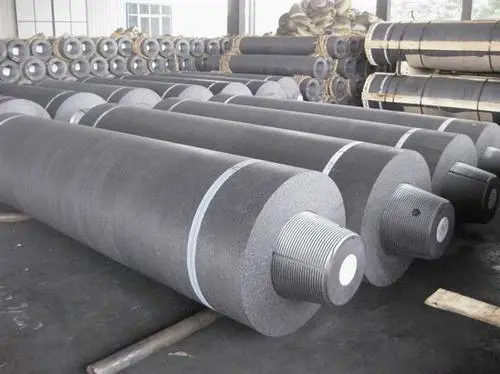
Graphite electrodes play a vital role in modern manufacturing processes, particularly in industries such as electric arc furnace (EAF) steelmaking, as well as other metal melting and refining operations. Graphite electrodes, made from a form of carbon known as graphite, are used in high-temperature applications that require efficient and reliable electrical conductance.
One of the primary uses of graphite electrodes is in EAF steelmaking. EAFs are used to produce steel by melting scrap metal in an electric arc. Graphite electrodes are used to provide the electrical energy required for the melting process. They form the conductive path that allows the electric current to pass through the furnace, generating the high temperatures needed to melt the metal. Graphite electrodes are typically connected to a power source and can withstand the intense heat generated during the steelmaking process.
Graphite electrodes are also used in other metal melting and refining operations, such as the production of non-ferrous metals like aluminum and copper. These operations often involve high-temperature processes where graphite electrodes are used to provide electrical energy for melting and refining the metals. Graphite electrodes are essential in these operations to ensure efficient and controlled heating, as well as to maintain the desired chemical composition of the molten metal.
One of the main reasons graphite electrodes are preferred in these applications is their ability to withstand high temperatures. Graphite has a high melting point and excellent thermal conductivity, allowing it to handle the intense heat generated in metal melting processes without deforming or breaking down. This makes graphite electrodes highly reliable and reduces the risk of downtime and equipment failure in manufacturing operations.
Another advantage of graphite electrodes is their low electrical resistance. This means that they can efficiently transmit electric current, resulting in more effective and energy-efficient melting processes. Graphite electrodes have a relatively high electrical conductivity compared to other materials, making them an ideal choice for applications where high current flow is required.
Graphite electrodes offer good mechanical strength and resistance to thermal shock. These properties are important for withstanding the physical and thermal stresses that occur during the melting process. Graphite electrodes must be able to endure rapid temperature changes, as well as the mechanical forces exerted by the molten metal. Their resilience helps to prevent damage and extend the lifespan of the electrodes.
Graphite electrodes play a vital role in modern manufacturing processes, particularly in steelmaking and other metal melting and refining operations. Their ability to withstand high temperatures, coupled with their excellent electrical conductivity and mechanical strength, makes them essential for efficient and reliable operations. The use of graphite electrodes ensures effective heating, controlled melting, and the maintenance of required chemical compositions in various metal manufacturing applications.
